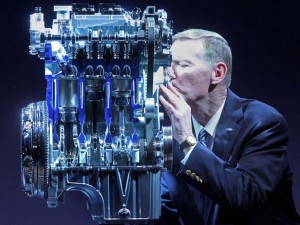Is the conventional, or normally aspirated, gasoline engine on its way out? It’s starting to look more and more like it as manufacturers adopt alternatives such as battery-electric vehicles and turbocharged gas and diesel powertrains.
In fact, Volkswagen appears to be set on a course to go all turbo over the next several years, according to a senior executive, while Ford is on a similar route, the company noted as it marked the production of the two-millionth vehicle equipped with its turbocharged EcoBoost technology.
“You have to have a turbo these days,” Marc Trahan, an executive vice president with Volkswagen of America, told the Detroit News. “We only have one normally aspirated gas engine, and when we go to the next generation vehicle that it’s in, it will be replaced. So, three, four years maximum.”
Turbochargers help ram more air into an engine’s cylinders when needed. In effect, they create the equivalent of a bigger – and more powerful — engine upon demand. The benefit is that when power demands are light, a motorist gets the fuel economy of the smaller engine.
This approach is being adopted in more and more vehicles across a broad range of automotive segments, from BMW sports cars to big Ford pickups. Ferrari is reported to be migrating to turbochargers on its own future supercars.
(Porsche’s 50th anniversary 911 special edition is a turbo-powered monster. Click Herefor more.)
The switch is, in fact, expected to accelerate as manufacturers struggle to meet tough new emissions and fuel economy standards around the world, including the 54.5 mpg target set for the U.S. in 2025.
Turbochargers have also gained ground because of the improved performance and driving dynamics they can provide. They have already shown a significant growth in Europe where they have helped transform the traditionally slow and undesirable diesel into one of the market’s most popular powertrain options – representing nearly 50% of total Continental sales.
(Chevy may use 600-hp twin-turbo engine in new Z07 Corvette. Click Herefor the inside story.)
By 2017, turbos will be used on an 36 million new passenger vehicles annually, Honeywell Transportation Systems recently forecast. That would represent about 40% of the projected automotive market. In 2011, turbos were used on just 20 million vehicles – about 25% of global automotive volume.
Among the biggest proponents is Ford Motor Co. The maker built its 2 millionth EcoBoost engine this week, the technology using turbos – as well as diesel-like, high-pressure fuel injection – to sharply boost mileage without sacrificing performance.
The maker now offers EcoBoost on 85% of its worldwide engine line-up, and 90% of the Escape crossovers it is selling in the U.S. are equipped with one of the available, turbocharged engines. So are a significant number of F-Series pickups, which are now offered with both conventional and EcoBoost V-6s.
Doing away with the naturally aspirated gas engine is “an option,” said powertrain chief engineer Joe Bakaj said Ford will consider “at some point in the future.”
A separate study by LMC Automotive forecasts that turbochargers will have been used on 3 million of the vehicles sold in North America this year, up for 2.1 million in 2012.
But today’s turbos may themselves be victims of changing technology, never mind regulatory demands. In order to meet tough federal mileage mandates, many industry experts believe that future vehicles will more and more require an assist from some form of “electrification.” That could range from so-called mild hybrids up to pure battery-electric propulsion.
Today, almost 4% of the U.S. market is made up of hybrids which function, in many ways, like electric turbochargers. They allow the use of a smaller engine by kicking in an extra boost of power during take-off and hard acceleration.
Of course, some makers are pairing turbocharged engines with electric drivelines to deliver even more of a boost on launch, an approach that could gain more followers if customers demand better performance than most of today’s hybrids are capable of delivering.


Auto makers who sell in the U.S. do not have a choice because of the absurd and impossible to meet 54.5 mpg CAFE requirement Obama and the EPA pulled from their orifice.
BTW, VW has already gone all turbo in Europe for many models with 1.2L and 1.4L Turbo gas and 1.6L Turbo Diesels the only engine choices.
The issue has always been cost so now consumers will be saddled with the increase cost and weight of a Turbo engine to obtain better mpg. The increased torque at low revs does make the cars more fun to drive as long as the engine displacement isn’t excessively undersized for the application.